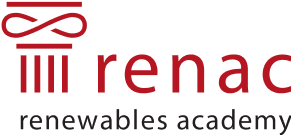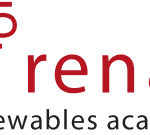This website uses cookies so that we can provide you with the best user experience possible. Cookie information is stored in your browser and performs functions such as recognising you when you return to our website and helping our team to understand which sections of the website you find most interesting and useful.
Customer-specific programmes
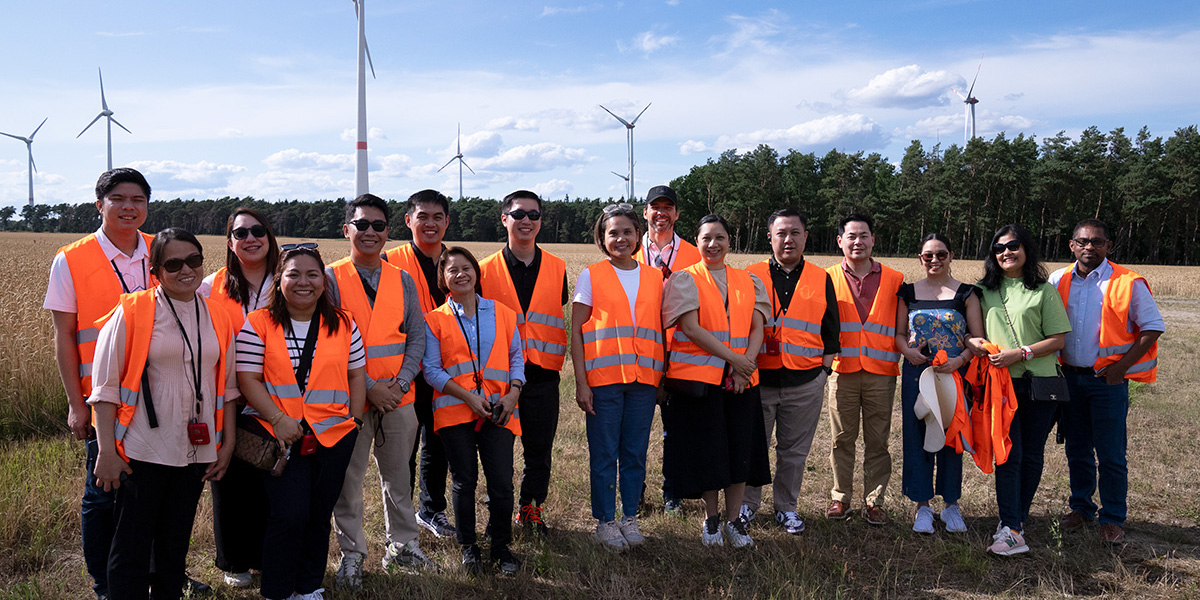
Job requirements in the green energy markets are complex and manifold. To ensure a company or organisation success, employees need extensive skills and up-to-date know-how.
RENAC customer-specific programmes offer the best way to meet participants’ training objectives:
- Analysis of participants’ capacity needs
- Selection of training contents and methods according to prior knowledge and needs
- The most suitable trainers
- Development of comprehensive materials with the highest quality standards
- Implementation of the training
Additionally, the training can be adjusted in duration and depth, organised for groups of various sizes and adapted to cover various technologies. Clients can determine when and where the training takes places.
Filter and search
Type
Name
Duration
Study time
Info
- different climate zones, energy balance of buildings, energy consumption, energy flows, green buildings, policies, standards and norms
hours
Content:
- Energy consumption in buildings
- Buildings in different climate zones
- Energy efficiency policies and buildings standards
- Benefits of “green” buildings
Learning objectives:
After the seminar, participants will be able to:
- Report the relevance of buildings in the context of climate mitigation
- Compare different energy efficiency standards for buildings
- Explain how climate factors affect structural measures and the buildings’ energy consumption
- Illustrate benefits of energy efficiency in buildings
- Compare economics of green buildings with conventional type of buildings
Target group:
This training suits those who
- are new to Energy Efficiency
- need a comprehensive but concise overview on concepts of energy efficiency and the relevant energy flows in buildings have to be aware of how climate factors influence the energy consumption and the design of a building
- want to know international standards for the assessment of the energy performance of buildings and green buildings
- air conditioning, building envelope, heating ventilation, lighting, passive solar architecture, renewable energies
hours
Content:
• Principles of energy efficient buildings
• Building structure – passive side
• Building structure – active side
Learning objectives:
After the seminar, participants will be able to:
• assess building materials in terms of their physical properties with regard to thermal insulation
• explain the principles of heat transfer and the related physical properties of building materials
• explain passive measure to enhance the energy efficiency in buildings
• demonstrate active measures to enhance energy efficiency in buildings
Target group:
This training suits those who
• need a comprehensive but concise overview on measures to enhance energy efficiency in the built environment
• have to be aware of the technical and economic saving potential of energy efficiency in the built environment
• need to evaluate active and passive energy efficiency measures.
- applications, battery storage systems, CAES, costs, FES, PHS, SMES, superCaps, TES
hours
Content:
• Terminology and parameters
• Applications
• Mechanical energy storage systems
• Electrical energy storage systems
• Thermal energy storage systems
• Chemical energy storage systems
• Economics of energy storage systems
Learning objectives:
After completing this course, participants will be able to:
- Present the purpose of energy storage and its future role
- Classify storage technologies
- Calculate specific costs and compare different economic aspects
- Explain complementarities of storage systems
Target group:
Professionals from the energy sector (engineers)
- equator principles, ESIA, practical implementation guidance, sample standards
hours
Content:
• The equator principles for the financial industry
• Concrete examples of environmental, social, climate change, gender or cultural standards
• Application procedures to access funds or credit for large grid connected projects
• Implementation, execution and monitoring of compliance with standards
• Potential risks for investors
Learning objectives:
After completion of this course, participants will be able to:
• compare different internationally recognized standards for environmental, social, climate change, gender or cultural issues
• explain environmental, social, climate change, gender or cultural standards in renewable energy project financing
• organise procedures and processes in order to comply to these standards from a project perspective
• assess in how far renewable energy and energy efficiency projects comply with these standards from a bank perspective
Target group:
This training suits financial experts, political stakeholders and project developers who
• deal with large-scale RE projects on international levels
• are responsible for environmental and social safeguards for large-scale infrastructure projects
• want to explore financing options from multilateral or international agencies
• need to commit to regulations from international financiers
- contracts, evaluation, financial viability, project finance, risks
Content:
- Introduction to financial due diligence
- Exercises on annualized cash flow valuation
- Wind power project finance and project contracts
- Risks associated with wind power cash flows
- Practical case studies of wind power project valuation with regard to important contracts
- Identifying relevant information to perform indicative appraisals by applying standard financial concepts to assess the financial viability of wind power projects
Learning objectives:
- Participants will be able to understand the critical aspects of the contractual basis of projects
- Participants will have an understanding of risks relevant for a financial due diligence for such projects
- Participants will be able to assess the financial value rooted in the project contracts of a wind power project for the financial due diligence process
Target group:
- Participants will be able to understand the critical aspects of the contractual basis of projects
- Participants will have an understanding of risks relevant for a financial due diligence for such projects
- Participants will be able to assess the financial value rooted in the project contracts of a wind power project for the financial due diligence process
- financial modelling, renewable power projects
Content:
• Financial models and modelers
• FAST Standard: terminology and rules
• FAST Standard: timing flags
• Model optimisation
Learning objectives:
After completion of this course, participants will be able to:
• Build their own financial models (cash flow waterfall, calculation of financial metrics, etc. ) using the FAST standard to ensure accessibility and transparency
Target group:
This training suits those who:
• Project Developers
• Professionals working in financing institutions
• Consultancies
- appraisal of the client, climate performance assessment, environmental, ESCOs, social, technical/financial appraisal
hours
Content:
• Energy efficiency vs. traditional investment finance
• Appraisal of client/investor
• Technical appraisal
• Financial appraisal
• Environmental appraisal
• Monitoring
• Energy service companies
• Appraisal of Energy Service Companies (ESCOs)
Learning objectives:
After completing this course, participants will be able to:
• Distinguish the nature of energy efficiency projects from conventional investments,
• Organise an energy efficiency project assessment from the perspective of a bank
• Analyse different concepts of ESCOs as a new innovative business model in the energy sector
• Determine the special aspects of ESCO financing
Target group:
This training suits those who:
• Develop energy efficiency as a new business line in a financial organisation
• Assess loan applications for energy efficiency projects
• Develop energy efficiency projects and need financing
• Want to establish an Energy Service Company (ESCO)
- biodiesel, bioethanol, biomass to liquid (BTL), lignocellolosic biomass, sustainability aspects
Content:
- Resources
- Production of different biofuels
- Specifications of biofuels
- Applications
- Project planning and development of biodiesel/ bioethanol production projects
- Economics of biodiesel / bioethanol projects
- Second generation: resources, technologies and conversion
- Market development and legal frameworks
- Sustainability aspects and certification
Learning objectives:
After the seminar participants will be able to:
- Classify the different resources and processing technologies
- Evaluate economic and technical feasibility of biodiesel projects
- Discuss legal requirements
- Debate the advantages and challenges of biofuel plants
Target group:
- Project developers or engineers who want to expand their field of activities
- Employees of public authorities, ministries and governmental and non governmental organisations
- Farmers interested in Biofuel Technology
- demand-side integration, dispatchable generation, grid integration of renewable energies, levelised cost of flexibility, market frameworks, storage
hours
Content:
• Power system transformation
• Flexibility options
• Cost of flexibility
• Market frameworks
Learning objectives:
After completing this course, participants will be able to:
- Explain the key role of flexibility in successful power system transformation
- Describe different flexibility options and name important measures
- Formulate the framework for a cost-effective power system transformation
Target group:
This course suits those who
- Want to know how to increase the power system flexibility
- Are involved with power system transition and to integrate vRE
- Take a holistic view on the power system with vRE
- boundary conditions, congestion management, demand-side management, infrastructure improvements, limits
hours
Content:
• Boundary conditions and procedures for grid operation
• Infrastructure improvements for VRE integration
• Congestion management with consideration of low carbon emissions
Learning objectives:
After completing this course, participants will be able to:
- Identify the technical limits of electrical grids,
- Describe the most important boundary conditions and procedures for grid operation,
- Explain which grid infrastructure components allow the transmission and distribution of high shares of VRE generation across the power system, and
- Analyse congestion management procedures with additional consideration of low carbon emissions.
Target group:
This course suits those who
- Are involved in grid operation, transmission and distribution with high shares of variable renewable energy (vRE)
- Want to understand options to manage grid infrastructure with high amount of vRE
- Need to develop strategies to integrate vRE into grid operation
- flexibility parameters, market environments, operation and maintenance, operational costs, retrofit measures
hours
Content:
• Dimensions of flexibility
• Operation and maintenance of flexible power plants
• Retrofit measures for thermal power plants
• Implementation and costs
• Market environments for improved generation flexibility
• Case studies
Learning objectives:
After completing this course, participants will be able to:
- Explain what flexible operation of thermal power plants means
- Describe important technical measures facilitating this mode of operation
- Determine key success factors for operating flexible thermal power plants in an economically viable way
Target group:
This course suits those who
- Are involved in planning and operation of thermal power plant as well as retrofit of power plants to increase their flexibility
- Have to determine the role of thermal power plants in an energy transition (regulatory or political perspective)
- Prepare various types of studies on vRE system integration
Content:
• Design and sizing of systems
• main plant components
• international standards
• Sustainability
• Requirements for the preparation of bankable business cases
• Economic viability
• Financial evaluation of business cases
• Checklists
Learning objectives:
After completion of this course, participants will be able to:
• explain the design and sizing of important plant components
• explain the main plant components
• explain plant operation and safety
• assess the economic viability.
Target group:
This training suits those who:
• The training is to be designed for professionals who want to develop projects (project developers) as well as
• for employees of banks, insurance companies and other financial institutions (financiers)
Content:
- Energy consumption in buildings
- Buildings in different climate zones
- Energy efficiency policies and buildings standards
- Benefits of “green” buildings
Learning objectives:
After the seminar, participants will be able to:
- Report the relevance of buildings in the context of climate mitigation
- Compare different energy efficiency standards for buildings
- Explain how climate factors affect structural measures and the buildings’ energy consumption
- Illustrate benefits of energy efficiency in buildings
- Compare economics of green buildings with conventional type of buildings
Target group:
This training suits those who
- are new to Energy Efficiency
- need a comprehensive but concise overview on concepts of energy efficiency and the relevant energy flows in buildings have to be aware of how climate factors influence the energy consumption and the design of a building
- want to know international standards for the assessment of the energy performance of buildings and green buildings
Content:
• Principles of energy efficient buildings
• Building structure – passive side
• Building structure – active side
Learning objectives:
After the seminar, participants will be able to:
• assess building materials in terms of their physical properties with regard to thermal insulation
• explain the principles of heat transfer and the related physical properties of building materials
• explain passive measure to enhance the energy efficiency in buildings
• demonstrate active measures to enhance energy efficiency in buildings
Target group:
This training suits those who
• need a comprehensive but concise overview on measures to enhance energy efficiency in the built environment
• have to be aware of the technical and economic saving potential of energy efficiency in the built environment
• need to evaluate active and passive energy efficiency measures.
Content:
• Terminology and parameters
• Applications
• Mechanical energy storage systems
• Electrical energy storage systems
• Thermal energy storage systems
• Chemical energy storage systems
• Economics of energy storage systems
Learning objectives:
After completing this course, participants will be able to:
- Present the purpose of energy storage and its future role
- Classify storage technologies
- Calculate specific costs and compare different economic aspects
- Explain complementarities of storage systems
Target group:
Professionals from the energy sector (engineers)
Content:
• The equator principles for the financial industry
• Concrete examples of environmental, social, climate change, gender or cultural standards
• Application procedures to access funds or credit for large grid connected projects
• Implementation, execution and monitoring of compliance with standards
• Potential risks for investors
Learning objectives:
After completion of this course, participants will be able to:
• compare different internationally recognized standards for environmental, social, climate change, gender or cultural issues
• explain environmental, social, climate change, gender or cultural standards in renewable energy project financing
• organise procedures and processes in order to comply to these standards from a project perspective
• assess in how far renewable energy and energy efficiency projects comply with these standards from a bank perspective
Target group:
This training suits financial experts, political stakeholders and project developers who
• deal with large-scale RE projects on international levels
• are responsible for environmental and social safeguards for large-scale infrastructure projects
• want to explore financing options from multilateral or international agencies
• need to commit to regulations from international financiers
Content:
- Introduction to financial due diligence
- Exercises on annualized cash flow valuation
- Wind power project finance and project contracts
- Risks associated with wind power cash flows
- Practical case studies of wind power project valuation with regard to important contracts
- Identifying relevant information to perform indicative appraisals by applying standard financial concepts to assess the financial viability of wind power projects
Learning objectives:
- Participants will be able to understand the critical aspects of the contractual basis of projects
- Participants will have an understanding of risks relevant for a financial due diligence for such projects
- Participants will be able to assess the financial value rooted in the project contracts of a wind power project for the financial due diligence process
Target group:
- Participants will be able to understand the critical aspects of the contractual basis of projects
- Participants will have an understanding of risks relevant for a financial due diligence for such projects
- Participants will be able to assess the financial value rooted in the project contracts of a wind power project for the financial due diligence process
Content:
• Financial models and modelers
• FAST Standard: terminology and rules
• FAST Standard: timing flags
• Model optimisation
Learning objectives:
After completion of this course, participants will be able to:
• Build their own financial models (cash flow waterfall, calculation of financial metrics, etc. ) using the FAST standard to ensure accessibility and transparency
Target group:
This training suits those who:
• Project Developers
• Professionals working in financing institutions
• Consultancies
Content:
• Energy efficiency vs. traditional investment finance
• Appraisal of client/investor
• Technical appraisal
• Financial appraisal
• Environmental appraisal
• Monitoring
• Energy service companies
• Appraisal of Energy Service Companies (ESCOs)
Learning objectives:
After completing this course, participants will be able to:
• Distinguish the nature of energy efficiency projects from conventional investments,
• Organise an energy efficiency project assessment from the perspective of a bank
• Analyse different concepts of ESCOs as a new innovative business model in the energy sector
• Determine the special aspects of ESCO financing
Target group:
This training suits those who:
• Develop energy efficiency as a new business line in a financial organisation
• Assess loan applications for energy efficiency projects
• Develop energy efficiency projects and need financing
• Want to establish an Energy Service Company (ESCO)
Content:
- Resources
- Production of different biofuels
- Specifications of biofuels
- Applications
- Project planning and development of biodiesel/ bioethanol production projects
- Economics of biodiesel / bioethanol projects
- Second generation: resources, technologies and conversion
- Market development and legal frameworks
- Sustainability aspects and certification
Learning objectives:
After the seminar participants will be able to:
- Classify the different resources and processing technologies
- Evaluate economic and technical feasibility of biodiesel projects
- Discuss legal requirements
- Debate the advantages and challenges of biofuel plants
Target group:
- Project developers or engineers who want to expand their field of activities
- Employees of public authorities, ministries and governmental and non governmental organisations
- Farmers interested in Biofuel Technology
Content:
• Power system transformation
• Flexibility options
• Cost of flexibility
• Market frameworks
Learning objectives:
After completing this course, participants will be able to:
- Explain the key role of flexibility in successful power system transformation
- Describe different flexibility options and name important measures
- Formulate the framework for a cost-effective power system transformation
Target group:
This course suits those who
- Want to know how to increase the power system flexibility
- Are involved with power system transition and to integrate vRE
- Take a holistic view on the power system with vRE
Content:
• Boundary conditions and procedures for grid operation
• Infrastructure improvements for VRE integration
• Congestion management with consideration of low carbon emissions
Learning objectives:
After completing this course, participants will be able to:
- Identify the technical limits of electrical grids,
- Describe the most important boundary conditions and procedures for grid operation,
- Explain which grid infrastructure components allow the transmission and distribution of high shares of VRE generation across the power system, and
- Analyse congestion management procedures with additional consideration of low carbon emissions.
Target group:
This course suits those who
- Are involved in grid operation, transmission and distribution with high shares of variable renewable energy (vRE)
- Want to understand options to manage grid infrastructure with high amount of vRE
- Need to develop strategies to integrate vRE into grid operation
Content:
• Dimensions of flexibility
• Operation and maintenance of flexible power plants
• Retrofit measures for thermal power plants
• Implementation and costs
• Market environments for improved generation flexibility
• Case studies
Learning objectives:
After completing this course, participants will be able to:
- Explain what flexible operation of thermal power plants means
- Describe important technical measures facilitating this mode of operation
- Determine key success factors for operating flexible thermal power plants in an economically viable way
Target group:
This course suits those who
- Are involved in planning and operation of thermal power plant as well as retrofit of power plants to increase their flexibility
- Have to determine the role of thermal power plants in an energy transition (regulatory or political perspective)
- Prepare various types of studies on vRE system integration
Content:
• Design and sizing of systems
• main plant components
• international standards
• Sustainability
• Requirements for the preparation of bankable business cases
• Economic viability
• Financial evaluation of business cases
• Checklists
Learning objectives:
After completion of this course, participants will be able to:
• explain the design and sizing of important plant components
• explain the main plant components
• explain plant operation and safety
• assess the economic viability.
Target group:
This training suits those who:
• The training is to be designed for professionals who want to develop projects (project developers) as well as
• for employees of banks, insurance companies and other financial institutions (financiers)
Target Groups
Public sector officials for legal frameworks, regulation and implementation:

- Ministries
- Regulators
- Local administrations
Multipliers and development organisations:

- Development corporations
- Energy agencies
- International financing institutions
- NGOs
Private sector:

- Project developers
- System integrators
- Engineers and technicians
- Investors
- Financing institutions
- Grid operators
Capacity building and dissemination sector:

- Public and private training institutions
- Vocational training institutions
- Universities
Value Chain
We design and implement customer-specific programmes and services along the value chain in a holistic concept.
Our approach to Renewable Energy (RE) and Energy Efficiency (EE) is manifold: technology related knowledge is the basis and then each RENAC training and service focus on technical, economic, legal or project related aspects according to the target group. RENAC is also very active in international business matchmaking and market development services.
In our capacity building services we supply a variety of programmes to train trainers, to build training centres and to establish quality assurance processes.
Our Training Concept
Customer-Specific Programmes – what does it mean?
We offer customer-specific programmes according to client needs and participant job requirements in all green energy sectors. Based on an analysis of requested knowledge or specific job tasks and the level of existing knowledge, we develop a training concept proposal.
The concept includes recommendations for online or in-person trainings, or both. We develop the training concept taking the given resources on budget and learning time into account. After feedback from the client, we fine-tune the concept for approval.
Depending on the needs of our clients, we offer different levels of trainings (basic, intermediate, and advanced).
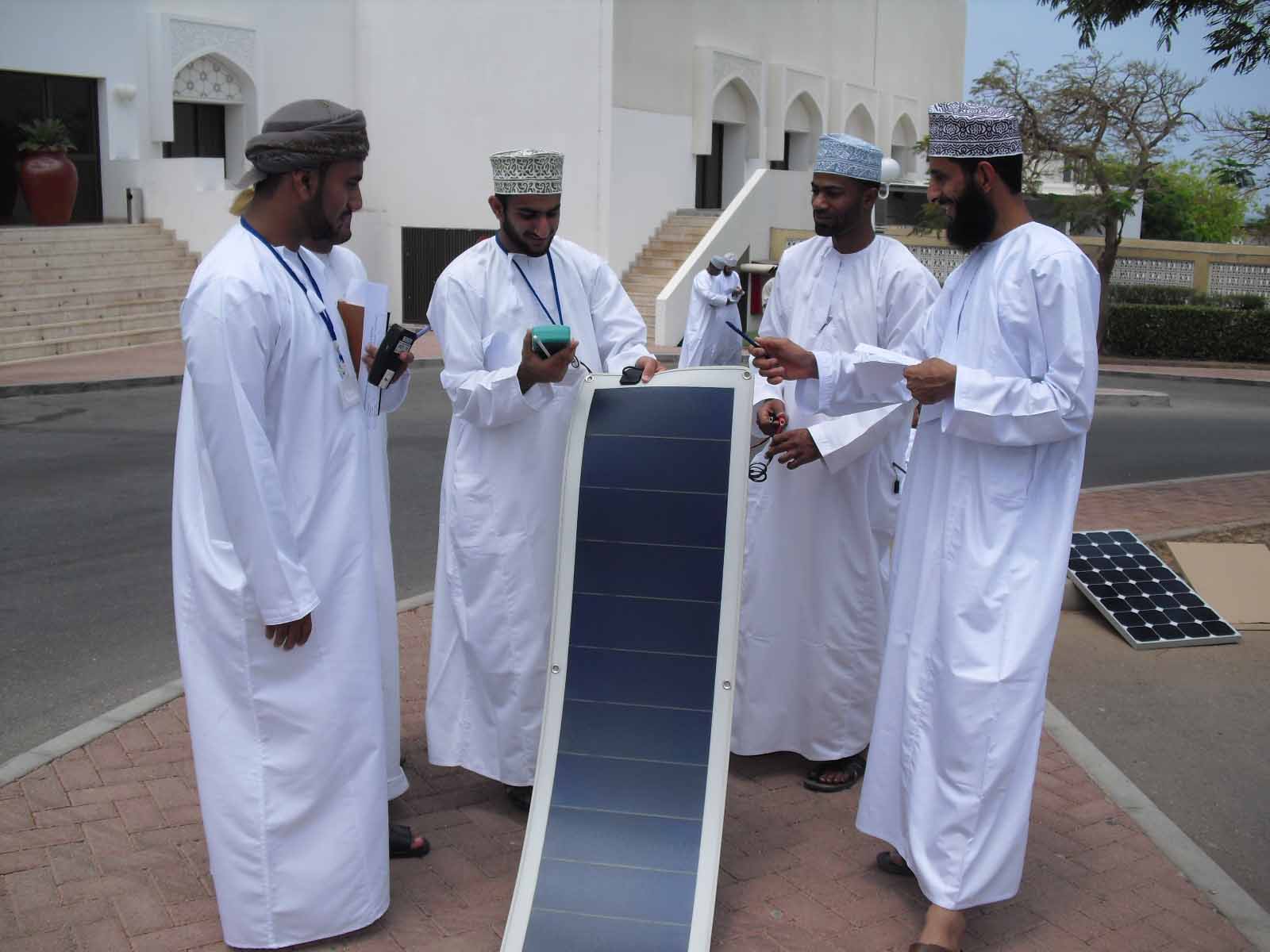
Service Catalogue
Find detailed information about the programme that best aligns with your needs and preferences.
Are you interested in a Customer-specific programmes?
Kindly fill out this questionnaire and attach it to the form on the right:
© 2024 | Renewables Academy (RENAC) AG
